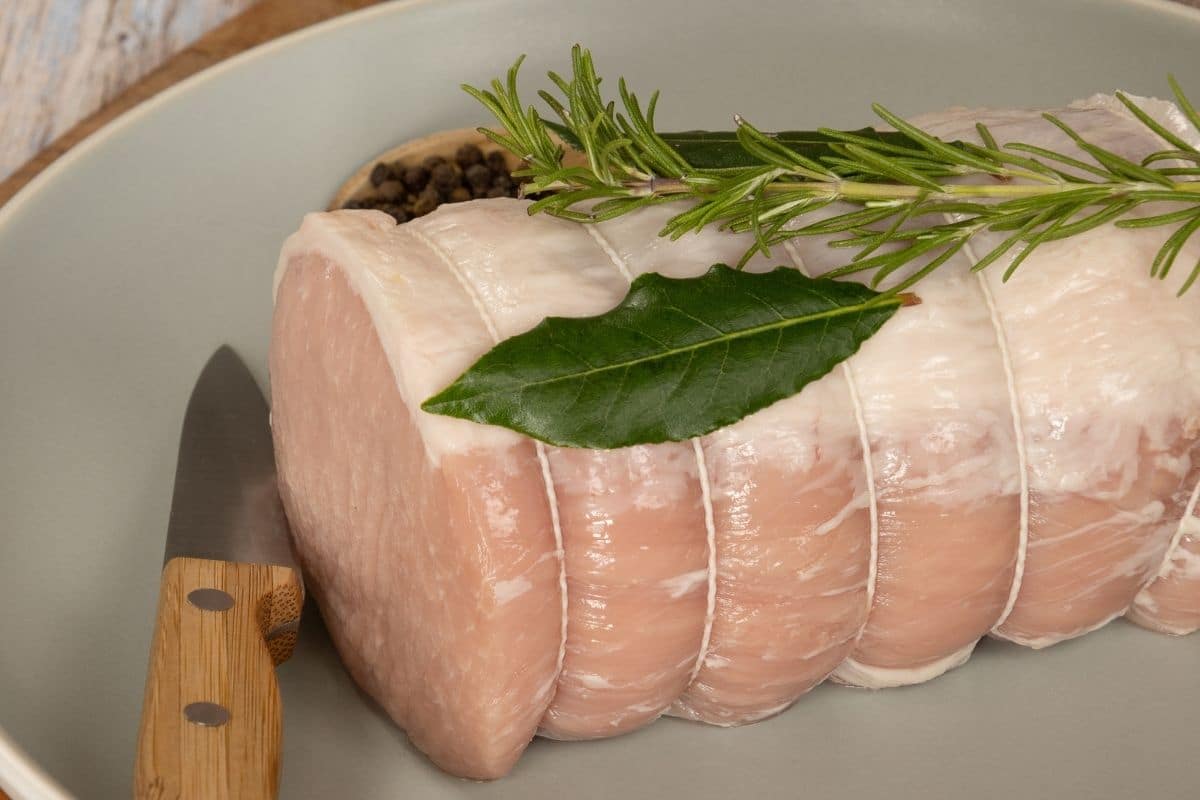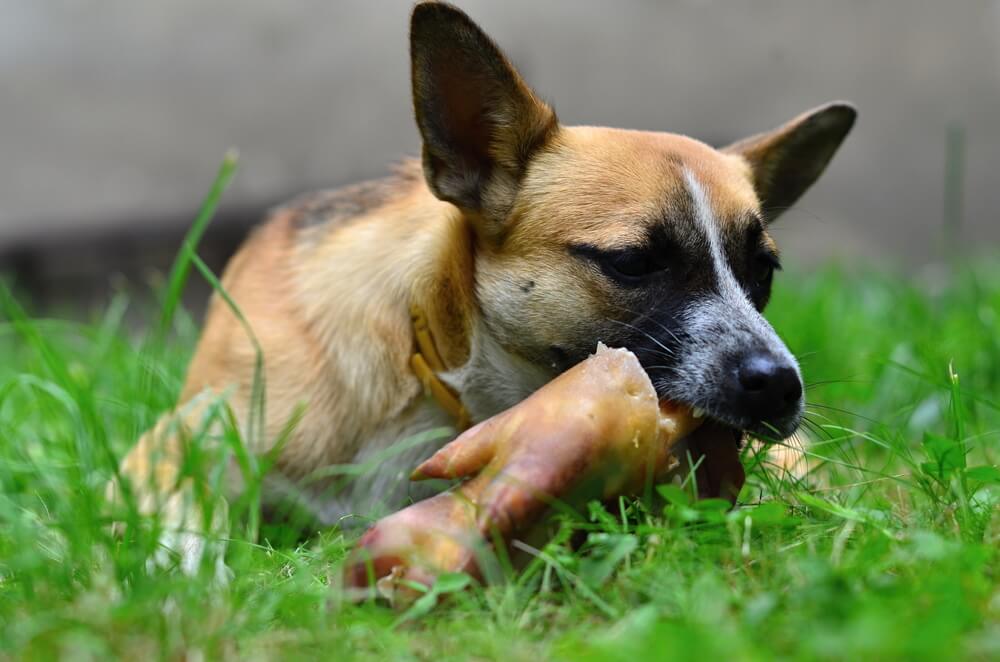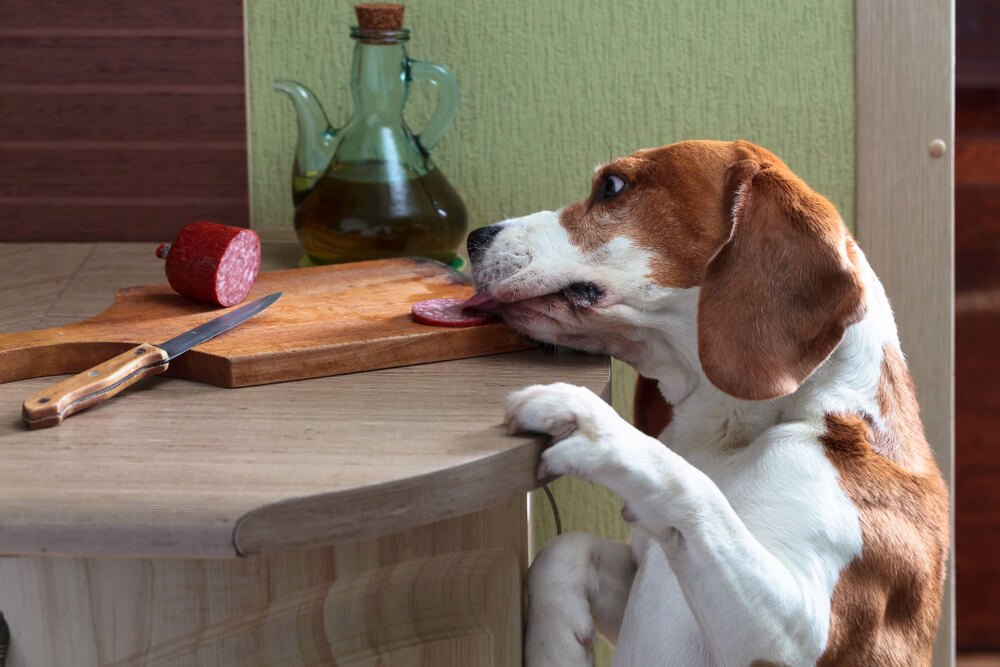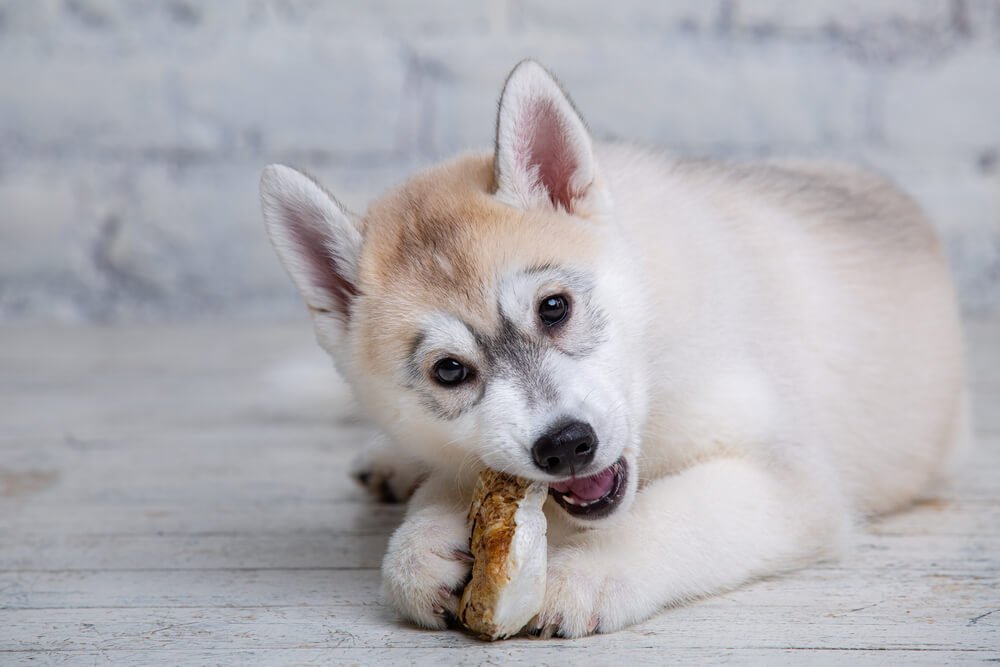A lot of people eat pork products every day, like bacon, sausages, mince, and chops. There are so many tasty options. But did you know that not all of these are safe for dogs to eat? Since dogs are omnivores (meaning they can eat both plants and animal protein), we often don’t think twice about giving them our food. But before you give your dog pork-based table scraps, here are some important things to think about.
Pork is a tasty meat that many dog owners wonder if they can share with their canine companions. The answer is yes you can feed cooked pork to dogs but there are some important things to keep in mind. In this article, we’ll cover everything you need to know about feeding pork to dogs.
Is Pork Safe for Dogs to Eat?
Plain, cooked pork without any seasonings or spices is safe for dogs to eat. Pork is a good source of protein, vitamins, and minerals for dogs. It can make an occasional tasty treat or be added as part of a balanced homemade diet.
However there are some risks with raw pork and certain pork products that make them unsafe for dogs. These include
-
Trichinosis – Raw or undercooked pork may contain trichinella parasites that can cause trichinosis, which can make dogs seriously ill. Thorough cooking destroys any parasites.
-
Bacteria – Raw pork can contain harmful bacteria like salmonella and listeria. Cooking pork to a safe internal temperature kills any dangerous bacteria.
-
Bones – Pork bones become brittle when cooked and can easily splinter. Bone fragments can cause choking hazards or internal injuries. Never feed cooked pork bones to dogs.
-
Seasonings – Heavily seasoned pork products like bacon, ham, and sausages contain excessive salt, fat, spices, onions, garlic, and other flavorings that are unsafe for dogs.
So the key is to only feed dogs plain cooked pork, without bones or seasonings. Thorough cooking is essential to destroy parasites and bacteria. This makes pork safe and provides dogs with a tasty meat treat.
Benefits of Pork for Dogs
In moderation, plain cooked pork can have some benefits for dogs:
-
Protein – Pork is a high quality source of complete protein. Protein provides amino acids that are vital for building and maintaining muscle.
-
Vitamins and minerals – Pork contains B vitamins like thiamine, niacin, vitamin B6 and B12 along with minerals like zinc, iron, potassium and phosphorus. These support overall health.
-
Flavor – Many dogs love the meaty taste of pork. It can be a tasty occasional treat or addition to their diet when plain and simply cooked.
-
Allergies – Since pork is less common than beef or chicken, it may be tolerated by dogs with food allergies or sensitivities. Check with your vet before introducing though.
-
Weight management – Lean cuts of pork can be a low fat protein option to help dogs feel satisfied while controlling calories.
In small amounts, pork can provide nutritional variety and appeal to a dog’s carnivorous tastes. Just be sure to keep it simple and season-free.
Guidelines for Feeding Pork to Dogs
If you want to feed pork to your dog, follow these guidelines for their health and safety:
-
Avoid raw – Never feed raw pork. Always cook it thoroughly to an internal temperature of at least 145°F to kill parasites and bacteria.
-
Remove bones – Pork bones splinter when cooked and can puncture the digestive tract. Only feed boneless cuts of pork.
-
Keep it plain – Do not add any seasonings, marinades, sauces or salt to the pork. Flavorings and spices can be toxic for dogs.
-
Small portions – Since pork is fattier than other meats, feed smaller portions. Too much may cause stomach upset or pancreatitis.
-
Lean cuts – Choose lean cuts like pork loin or pork tenderloin. Trim off any excess fat before cooking which can cause digestive issues.
-
Moderation – While cooked pork is safe, it’s best reserved for occasional feeding or as a small part of a balanced diet. Don’t make it a dietary staple.
-
Supervise – Monitor your dog when giving pork as a chew treat to prevent choking. Take away if they gulp large pieces.
Following these tips will allow you to safely feed pork to dogs while avoiding potential risks. Check with your veterinarian, especially if your dog has health conditions.
Is It Healthy to Feed Pork to Dogs?
In moderation, plain cooked pork can be a healthy addition to most dogs’ diets. It provides high quality protein, B vitamins, zinc, iron, potassium and other nutrients dogs need. Many dogs find pork quite tasty as well.
However, pork has some downsides that require care when feeding it. Here are the main pros and cons:
Pros:
-
Contains essential amino acids from high biological value protein
-
Rich in thiamine, vitamin B6, vitamin B12, niacin, zinc, iron, potassium
-
Lower fat than high fat meats if lean cuts chosen
-
Provides variety to diet
-
Usually appealing taste for dogs
Cons:
-
Raw pork may contain trichinella parasites
-
High in fat when not fed in lean form
-
Cooked bones unsafe due to splintering risk
-
Too much may cause digestive upset
-
Processed forms contain excessive salt and preservatives
The key is sourcing lean cuts of pork, properly cooking it, removing bones and fat, and feeding plain pork sparingly. This minimizes the risks while allowing dogs to gain nutritional benefits. Check with your vet if concerned.
Pork Products to Avoid Feeding Dogs
While cooked plain pork is fine for dogs, there are many heavily processed pork products that should be avoided. Here are some of the most common:
-
Ham – Hams are very high in sodium from the curing process. Excessive salt intake can cause vomiting, diarrhea, and pancreatitis.
-
Bacon – Bacon is too high in fat and salt to feed more than tiny portions very occasionally. Too much can result in pancreatitis.
-
Sausages – Sausages contain a long list of seasonings and preservatives that are unhealthy and potentially toxic for dogs.
-
Pork rinds – These crunchy deep fried skins are very greasy and salty. Both the fat and salt content make them a poor choice for dogs.
-
Pepperoni – Pepperoni has spices like garlic and onion that are toxic to dogs. It is also high in fat which can cause stomach issues.
-
Jerkies – Pork jerkies are dried and salted which creates high sodium levels bad for dogs. Brands also add sugar and spices.
-
Ribs – While the meaty rib meat may be okay, the bones pose a hazard and may have BBQ sauce.
Avoid feeding any seasoned, smoked, or cured pork like these products. The additives make them too unhealthy and risky. Only feed plain pork meat.
Can You Feed Pork Bones Safely?
It’s best to avoid giving any pork bones to dogs. Pork bones, especially when cooked, easily splinter into shards that can cause choking hazards or internal puncture wounds.
Raw pork bones are slightly safer, as they are softer and less brittle. However, the risks mean it’s still best to avoid:
-
Fracture risk – Raw pork bones may fracture into pieces that obstruct or perforate the gastrointestinal tract.
-
Choking hazard – Dogs may try to swallow larger raw pork bones whole and choke.
-
Pathogens – Raw pork may harbor harmful bacteria like salmonella.
-
Dental fractures – Some raw bones are sufficiently hard to potentially fracture teeth if aggressive chewers.
While some raw meaty bones like raw chicken wings can be okay for large dogs, raw pork bones are riskier. And any cooked pork bones should never be fed.
For safe chewing, choose products designed for dog chewing like bully sticks, rubber toys, or specially formulated dental chews. Avoid bones.
How Much Pork Can You Feed a Dog?
Since pork is fattier than other meats, dogs only need smaller portions to meet their calorie requirements. The exact amount depends on your dog’s size and activity level:
-
Small dogs – A few small shreds of pork a couple times a week is plenty. Over 1 oz should be avoided.
-
Medium dogs – Up to 2 ounces of lean cooked pork a few times a week is suitable for less active medium dogs. Active dogs can have a bit more.
-
Large dogs – Larger dogs may tolerate 2-3 ounces of lean pork a few times a week, depending on diet and activity level. Limit to 4 ounces maximum.
-
Puppies – Growing puppies don’t require much more than small dogs. Give just 1-2 extra shreds of pork.
Always start with small amounts and gradually increase to avoid digestive upset. Since pork is just an occasional treat or addition, there’s no need to provide large portions. Stick within the safe guidelines based on your dog’s size.
Signs of an Allergic Reaction in Dogs to Pork
While less common than some protein allergies, dogs can develop allergies to pork. Signs of an allergy include:
- Itchy skin or recurrent ear infections
- Hives,

Is pork safe for dogs to eat?
The answer to this question is not as straightforward as yes or no. Certain pork products, thoroughly cooked in a dog-safe fashion, are safe to eat. However, there are many caveats to this which will consider below.
Which types of cooked pork are safe for dogs to eat and which ones aren’t?

It is no secret that dogs love to chew on bones. They are highly flavored and satisfy your dog’s urge to chew but did you know it is not a safe practice for your pup? Cooked bones become drier and brittle, making them more likely to splinter. These bone splinters can obstruct or even rupture your dog’s delicate digestive tract. Raw bones are less likely to break, but they are more likely to damage your dog’s teeth as they chew. Tooth fractures are painful for your dog and put them at risk of severe infections. They often require expensive dental treatment under a general anesthetic to treat.
Pork chops are often high in fat. High-fat foods can lead to tummy upset or even inflammation of the pancreas.
Pork rinds are usually high in both salt and fat. If swallowed whole, they may obstruct your dog’s food pipe. They are not suitable for your dog.
Cooked ribs contain bones that can represent a risk of gut obstruction or even rupture for your dog. They are also usually cooked in highly flavored sauces, which can contain ingredients toxic to your dog. Ribs are not suitable for your dog.
Even though sausages and bacon taste great to both people and dogs, they are high in fat and salt and shouldn’t be part of your dog’s diet.
As discussed, pork fat can be challenging for your dog to digest, which can lead to tummy upsets or put undue strain on the pancreas leading to inflammation. Fat is also extremely calorific, which may mean it causes your dog to pile on the pounds. Canine obesity is a rising pandemic globally and has many significant effects on your pup’s health.

Another reason why pork might not be good for your dog is if they are sensitive to or allergic to it. Some dogs have a condition called ‘food-responsive enteropathy” or FRE. FRE is a condition that leads to chronic signs of tummy upset such as vomiting and diarrhea. FRE can sometimes be triggered by the proteins in pork meat. If your vet thinks your pet has FRE, they will tell you to do some tests first and then try taking out certain proteins, like pork, from its diet. Blood tests for food allergies are not considered reliable. We’ve covered French Bulldog food allergies and Shih Tzu food allergies in separate articles.

Last but not least, when or how to feed dogs pork, we need to think about how to cook it. People like to season and flavor their food a lot, but some of these things can be very bad or even poisonous for dogs. For example, onion powders and garlic can lead to red blood cell damage, which can be fatal. BBQ sauces and other similar products are also not recommended. They can be high in salt and contain onion and garlic flavors. You don’t have to make a fancy meal for your dog when you cook pork for them. Just cook it plain or add a dash of stuff like spearmint. Similar rules apply when it comes to cooking chicken, turkey or beef for your dog.
Can Dogs Eat Pork? –
FAQ
Can I feed my dog pork instead of chicken?
What meat should dogs not eat?
Why is pork not in dog food?
Can pork upset dogs stomach?
